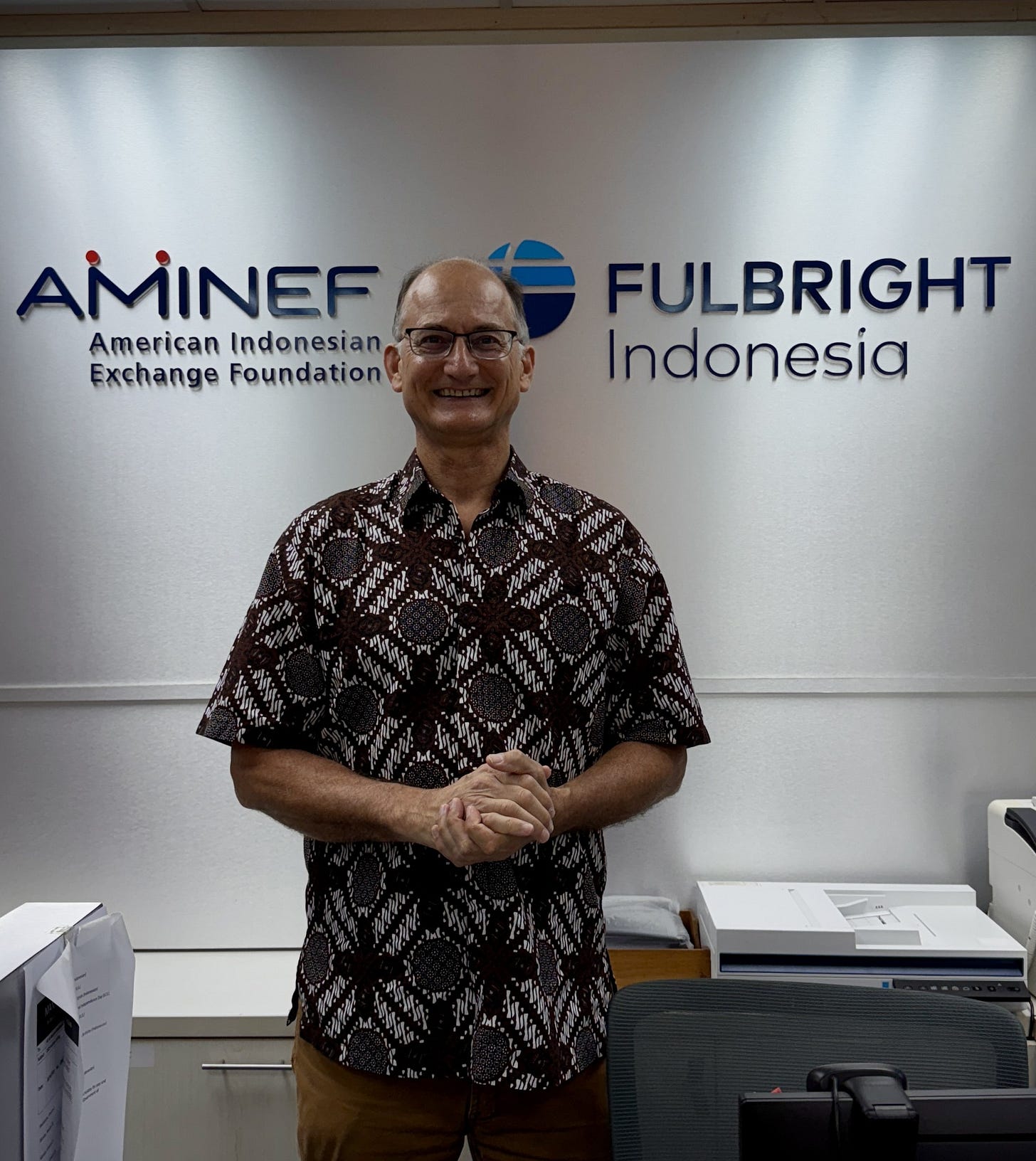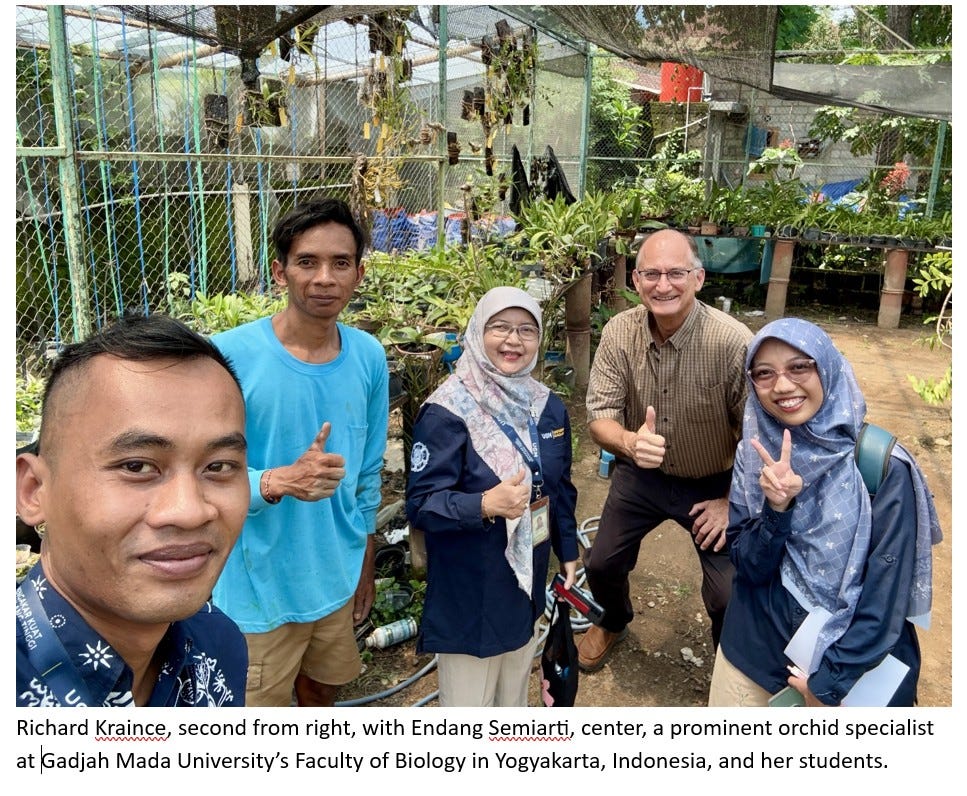Indo-Pacific Overture
A faculty member discovers a culture of conservation—and potential opportunities for students on co-op—in Southeast Asia.
Richard Kraince, associate professor of cooperative education, spent last winter as a Fulbright Fellow back in the part of the world—Southeast Asia—that inspired his graduate work and early career. But whereas his earlier journeys explored the relationship between religion and politics, Kraince’s November 2024-April 2025 foray focused on conservation and the impact of climate change on the natural world. It’s a topic he hopes the current generation of Antiochians becomes as enthusiastic about as he is.
Kraince loves plants. Active in various campus horticultural activities, he set up a system with an automatic watering device to make sure the large collection in the Olive Kettering library was taken care of while he was gone. The Fulbright took him to Indonesia, Malaysia, and the Philippines, among the most biodiverse countries on the planet, with the aim of documenting best practices in ecological education and ecosystem restoration. His work fell under the auspices of the Fulbright ASEAN Research Program, a partnership between United States and the 10-country Association of Southeast Asian Nations (ASEAN).
Kraince, who speaks the principal Indonesian and Malay languages, knew he wanted to study the ASEAN Heritage Parks, a protected collection of some 50 natural reserves and wildlife sanctuaries. But since he applied for the Fulbright as both an area studies and a higher education scholar, he felt his proposal needed an educational component to secure a grant. He found one in the ASEAN University Network on Ecological Education and Culture, “a whole initiative that is dedicated to how they develop a generation of Southeast Asians” with the mindset and skills to protect the environment.
Besides working with biologists at leading universities in each of his chosen countries, “I wanted time in nature,” Kraince says. He got his first chance in Singapore, where his flight from San Francisco landed, and explored an island off the northern coast where a mining site had been reclaimed as a natural habitat with hornbills, cockatoos, and a colony of otters. Later, he joined a trek with the Philippine Nature Journaling Club deep into the Mount Makiling Forest Reserve, a Heritage Park, in search of the rare Rafflesia plant. Producing the world’s largest flower, three feet or more wide, the Rafflesia is known informally as the “corpse plant” because it emanates a foul odor like the smell of rotting meat. This trait helps it attract pollinating flies and carrion beetles. Whether or not he was repulsed by the smell, Kraince remembers gorgeous surroundings and wonderful hiking companions, and counts the excursion as “one of the great experiences” of his fellowship.
The region’s exotic natural wonders might blind visitors to its vulnerability to climate change, evident in rising temperatures, catastrophic typhoons, flooding, coastal erosion, and coral degradation. But the climate threat is top of mind at the three universities where Kraince found collaborators: Ateneo De Manila University in Quezon City, Philippines, Gadjah Mada University in Yogyakarta, Indonesia, and the University of Malaya in Kuala Lumpur, Malaysia. Like other members of the ASEAN University Network, they champion the United Nations’ 17 aspirational Sustainable Development Goals. These range from ending poverty, hunger, and a series of communicable diseases to boosting clean energy and making cities resilient—all by 2030.
Ateneo De Manila’s Institute of Sustainability (AIS) serves as the regional hub of the University Network on Ecological Education and Culture. Faculty and students at the Jesuit institution, Kraince says, were “very focused around Pope Francis's efforts to promote environmental sustainability, and they're doing a lot around that.” They are encouraged by signs that Francis’s successor, Leo XIV, will follow a similar path.
Kraince also found a faith-inspired enthusiasm for protecting the environment in majority-Muslim Indonesia and Malaysia. He spent time at the “super-ambitious” new campus in Jakarta of the International Indonesian Islamic University, which offers a master's degree in climate change. “When I was in Indonesia, it seemed like almost every week there was some sort of a grouping of Islamic scholars coming together to talk about climate change, to talk about sustainability, and there was one in Malaysia as well.”
Returning to Yellow Springs, Kraince set about publishing what he’d learned from his five months in a region that has modernized substantially in the years since his last visit. In Indonesia, for instance, “there's still issues with hunger and stunting,” but the country is working to improve access to food, such as providing free lunch for elementary school children. “At the same time, they've got a very young population, so there's new universities and new trains and new subway systems.”
In Malaysia, Kraince was struck by the sheer variety of student activities at the University of Malaya’s Institute for Sustainability, from figuring out what to do with medical waste to collecting oral histories on the environment from villagers and incorporating literature and folklore, together with nature, in publications. Overall, he found, “especially in Indonesia and Malaysia, there's enormous optimism right now.” (There’s some evidence to back this up, Kraince notes: Results from the multi-year Global Flourishing Study, led by Harvard and Baylor, rank Indonesia first and the Philippines fourth when it comes to “living in a state in which all aspects of a person’s life are good.”Malaysia was not in the 22-nation study.)
Kraince is excited about prospects for Southeast Asia to become a destination for Co-op, which has sent Antiochians to 44 countries during his 13 years at the college. “We've done very little in Southeast Asia, because we've focused on the target language areas . . . Japanese, Spanish and French” that Antioch teaches. Students would encounter the most English speakers in the Philippines, but many university faculty members in all three countries speak English, particularly those in the sciences.
Problems other than a language barrier may be tougher for the Cooperative Education staff to work around. Money would have to be found for students’ travel and room and board, and co-op projects would need to be built around something other than paying jobs, due to employment restrictions on foreign labor in the three countries.
Given the Trump administration’s heightened scrutiny of foreign students who want to come to the United States, and a new, wider travel ban, U.S. students may be less welcome abroad than in the past. ““I think there are questions around external support for American co-op students internationally at the moment, given the way that the U.S, is treating students from other countries,” Kraince says. The Fulbright program itself, for decades accustomed to operating without administration interference, is being pulled into alignment with Trump’s priorities. All the members named to the oversight board by former President Joe Biden recently resigned. An added State Department review of U.S. scholars picked for next year resulted in seven of 17 researchers bound for Norway being rejected. According to the Wall Street Journal, their topics included climate change and diversity.
Still, Kraince is not discouraged. “I just think it's more challenging,” he says, but “that’s what we do in Co-op.” He likes to refer to the flexible vision for co-op in a Carnegie study of Antioch’s program published in 1960. While employment is central to most co-op experiences, “the big tent of co-op” also embraces “sustained cultural engagement in a region,” Kraince says. “It could be a period of language study abroad. It could be a period of volunteer work. It could be a period of significant artistic production.”
While Kraince’s fellowship focused on Southeast Asia’s natural landscape, curious students could pick from a rich array of study areas. History is one, and it’s a subject where Antioch boasts a rare connection to the region. José Ramos-Horta, president of ASEAN’s newest member state, Timor Leste (East Timor), earned a master’s degree in peace studies from Antioch University in 1984, turning in a 180-page thesis, “East Timor: A Case Study in International Law.” His country’s leading international spokesman during its struggle for independence, finally secured in 2002, Ramos-Horta shared the 1996 Nobel Peace Prize with Carlos Felipe Ximenes Belo, then the Catholic bishop of East Timor, “for their work towards a just and peaceful solution to the conflict in East Timor.”
Students who prefer to stay on campus can see examples of Southeast Asia’s natural treasures—orchids—in the library’s plant collection.






